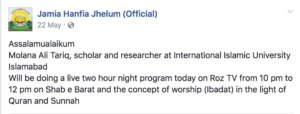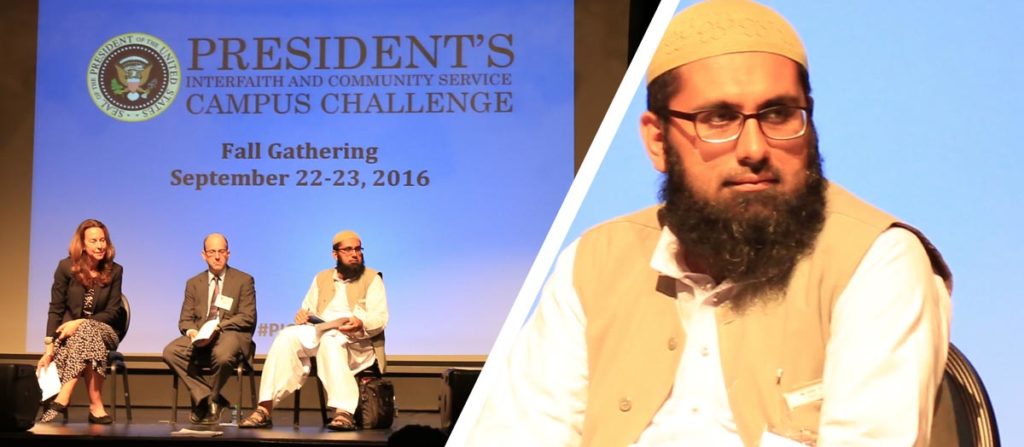The U.S. Department of Education and the White House invited a Taliban sympathizer to speak at PICSCC ( President’s Interfaith and Community Service Campus Challenge). The PICSCC was introduced by President Obama in 2011 to build bridges of understanding across communities by bringing together people from different religious and non-religious backgrounds.
This year, the two-day challenge was held at Gallaudet University in Washington D.C. which saw speakers from dozens of countries and various organizations come together and discuss various issues including ways to prevent violence & extremism among youth.
On September 23, the second day of the challenge, a seven-member panel was supposed to discuss how to engage youth in dialogue to counter violent extremism However, one panelist – the only Pakistani on the program – decided to skip the conversation and opted to take part in a discussion on Immigration and Migration instead.
Mr. Ali Tariq got his preliminary education at a religious seminary by the name of Jamia Hanafiah Talim-ul-Islam located in Northern Punjab. He later joined the seminary as a faculty member and taught Arabic and Islamic literature from 2008 to 2015.
The Jamia Hanafiah seminary where Mr. Tariq taught openly supports “Jihad against America” and it’s faculty has rallied in support of “Blasphemy killers”.
In 2011, the Hanfiah seminary staff and locals marched in support of Mumtaz Qadri, the man who shot Pakistani Minister Salman Taseer 28 times for speaking out in support of a Christian woman accused of blasphemy. The woman, Asia Bibi, was sentenced to death in 2010 under Pakistan’s controversial Blasphemy laws. At the time, Qadri was assigned to Taseer as his bodyguard, Qadri was hanged earlier this year, while Asia Bibi still languishes in jail.
Toaha Qureshi visits Jamia HanfiahIn 2014, the seminary invited British Islamist Toaha Qureshi to speak at their conference. Qureshi is a trustee of the London’s Stockwell Green Mosque. An investigation earlier this year by the BBC revealed that the Mosque distributed leaflets calling for the killing of Ahmadis, a minority Muslim group which is considered heretic by orthodox clergy.
In April 2015, while Mr. Tariq was still working at the seminary, speakers at Jamia Hanafiah’s annual convention called for ‘Jihad against the U.S. Forces in Afghanistan’ and called on attendees to support their “Afghan Taliban Brothers’. One of the key speakers Molana Kifayatullah said:
“We (Pakistan) made a big mistake by supporting America, when American forces were moving in to kill our Afghan Muslim Taliban brothers, we supported their killers, what would we answer Allah ?, We should have gone to help Mullah Omar and the Afghan Taliban, We should have fought against the Americans, the Jews and the Christians. They should be ashamed, they supported Americans and Christians.”
The Same cleric, Kifyatullah was arrested by Pakistan’s counter-terrorism department in 2015 for hate speech.
 On May 22nd, the seminary asked it’s facebook followers to watch Tariq’s TV appearance.
On May 22nd, the seminary asked it’s facebook followers to watch Tariq’s TV appearance.
Since 2010, Mr. Tariq has also simultaneously worked at the controversial International Islamic University Islamabad (IIUI) in various roles. Currently, he serves as a Consultant/Editor at the Iqbal Institute for Research & Dialogue(IRD) at the IIUI.
In 2015 Pakistan’s intelligence agencies reported that the university was promoting extremist doctrines and that Jihadis must not be allowed to impose their agenda.
During the program at Gallaudet University, Mr. Tariq refused to answer questions about his links to the seminary and his views on the Ahmadiyya Muslims. After the program, when approached by a Rabwah Times reporter, Tariq said that the decision by the Pakistani constitution to declare the Ahmadis non-Muslim was a “good decision”. When asked about the case of the Christian woman Asia Bibi, Tariq reiterated his stance saying he respected the decision by the authorities to hand her the death penalty.
The United States Commission on International religious Freedom has described Ahmadis as one of the worst persecuted communities in Pakistan.

